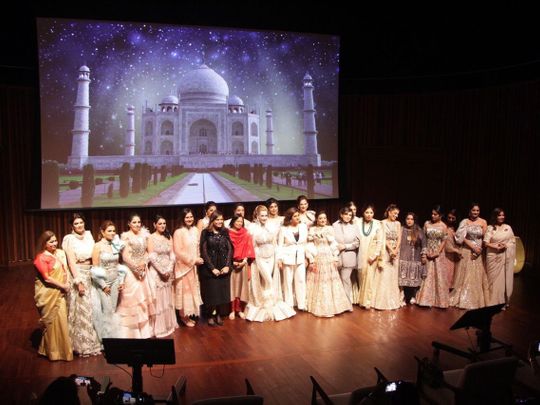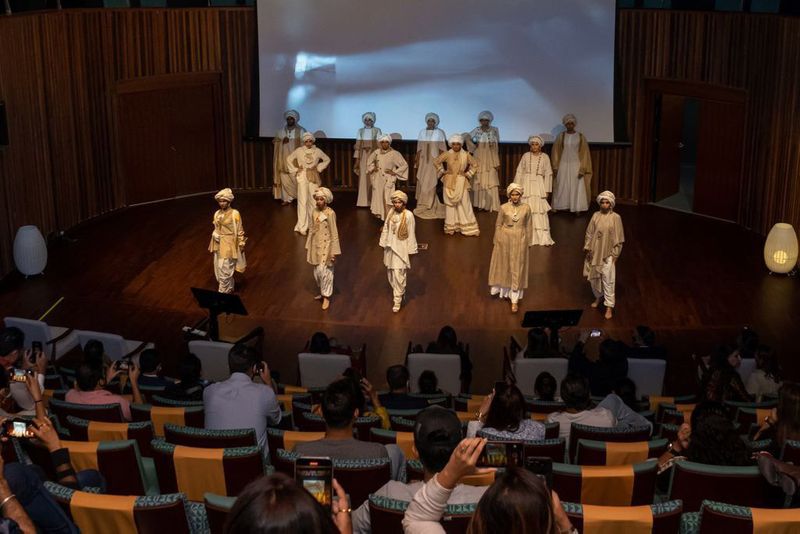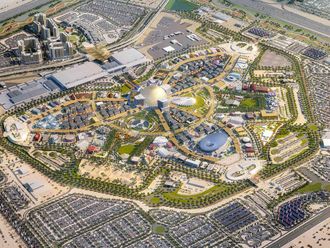
Dubai: The India Pavilion at Expo 2020 Dubai held a special show on sustainable textiles, called ‘Virasat’ (heritage), to mark the birth anniversary of Mahatma Gandhi. Items of natural, sustainable fabric were on display at ‘Virasat’. The show was presented by FLO, the Ladies wing of Federation of Indian Chambers of Commerce and Industry (FICCI) at the Terra auditorium at Expo 2020 Dubai.
Haute couture goes sustainable
Sustainability is the future of the fashion world and fabrics that are made from natural fibres with vegetable dyes are currently in vogue. Consumers the world over are increasingly concerned about where the products they use are manufactured. They are increasingly rejecting products made at sweatshops, exploiting the underprivileged.
In India, hand-woven textiles used to be the symbol of freedom and self-reliance. Mahatma Gandhi, the Father of the Nation, led the way with spinning ‘Khadi’, or homespun cotton yarn, on his homegrown spinning wheel and offered every Indian an opportunity to feel empowered by using ‘Khadi’ clothes. It was this very sentiment that was honoured by all the participants at ‘Virasat’. In India, fabrics made from fibres of fruit such as banana, pineapple and fibres from other natural products such as jute and coconut are now being used.
The Khadi Movement
Speaking to Gulf News, Ujwala Singhania, president of FLO, highlighted the significance of sustainability in fabrics. “One of Mahatma Gandhi’s most amazing achievements that deeply resonates with us at FICCI is the Khadi Movement, which we are paying tribute to. ‘Khadi’ is the favourite textile of our fashion houses. Fashion-conscious consumers are quick to adopt ‘Khadi’ denim jeans and modern Indian brides prefer having the brocaded Khadi ‘lehengas’ (long skirts) in their bridal trousseau.”
The movement for sustainable textiles has gone global
It is not just India, which has been leading the charge on eco-friendly fabrics. Sustainable fabrics are gaining ground worldwide. For instance, 28-year-old German biologist and designer Anke Domaske has successfully created fabrics out of curdled milk by isolating the protein. People have now come up with fabrics made out of orange peel and fibre, wood and bamboo shavings, spider-thread, recycled cotton fibre and even hemp among other materials. These have taken the fashion world by storm. Such fabrics are breathable, labour-intensive and have lower carbon emissions.

Talking about the revolution that ‘Khadi’ and other sustainable fabrics have brought about in India, Singhania said: “India’s fabric or textile industry dates back to 400 BC, according to Greek historian Herodotus. In the 17th Century, homespun Indian fabric was giving serious competition to machine-made French and British fabrics. Today, the impact of India’s sustainable fabrics on the global textile business is huge.
How do sustainable textiles make good business sense?
• Job creation: For every one person who is able to run the spinning machine, 50 jobs are created in hand-spinning. For every one person required to run a power loom, ten jobs are created for handloom weavers. In India, FLO has been rallying for employment of women and we have created platforms to showcase the potential of different sustainable fabrics to boost sales.
• Reduced carbon footprint: With less power, less water consumption, the production of these natural fibre textiles brings down carbon emission to negligible rates.
• Uniqueness of product: The sheer power and flow in a hand-crafted fabric makes it unique and different from a typical assembly-line factory creation, providing the right pleasure to clothing and fashion connoisseurs.
• Bringing back the grassroots people into business equations.
• Economically viable as a business option.







